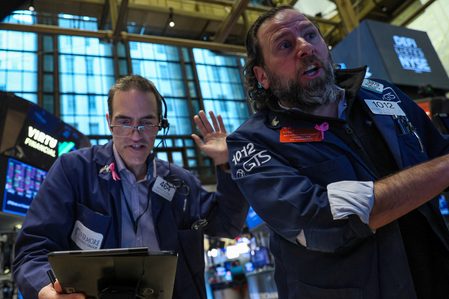SUMMARY
This is AI generated summarization, which may have errors. For context, always refer to the full article.

Investor sentiment remained fragile on Friday, March 17, despite massive rescue for the banking sector, leaving global equities under pressure while gold prices were poised for their largest one-week rally since March 2020.
US Treasury yields extended their slide, and oil prices dove to 15-month lows.
Data showed March US consumer sentiment fell for the first time in four months.
In a crisis that began with the collapse of US-based Silicon Valley Bank last March 10, investors lost confidence in US regional banks and Credit Suisse in Europe.
Risk appetite waned on Friday after showing signs of recovery on Thursday, March 16. Credit Suisse’s chief executive said on Friday the bank was working hard to stem customer outflows, although this could take time. Credit Suisse shares resumed their decline.
Analysts say the worry about a possible banking crisis is far from over despite a group of major banks injecting $30 billion in deposits into First Republic Bank, a midsized US lender, on Thursday.
The MSCI world equity index, which tracks shares in 49 nations, fell 0.55%.
European shares erased early gains and had their steepest weekly drop in five months, with the pan-European STOXX 600 finishing 1.3% lower. It was under pressure from bank, insurance, and financial services stocks.
European Central Bank (ECB) supervisors do not expect contagion for eurozone banks from the market turmoil, a source familiar with the content of an ad hoc supervisory board meeting this week told Reuters.
The Dow Jones Industrial Average fell 384.57 points, or 1.19%, to 31,861.98, the S&P 500 lost 43.64 points, or 1.10%, to 3,916.64, and the Nasdaq Composite dropped 86.76 points, or 0.74%, to 11,630.51.
Over the last two weeks, the S&P Banking index and the KBW Regional Banking index plunged by 4.6% and 5.4%, respectively, their largest two-week drops since March 2020.
The yield on benchmark 10-year Treasury notes fell to 3.423% versus 3.583% previously. The 2-year yield, which rises with traders’ expectations of higher fed fund rates, fell to 3.8354% from a previous close of 4.13%.
Germany’s 10-year government bond yield dropped to 2.069%, its lowest since the start of February, late in the session.
The ECB raised rates 50 basis points (bps) on Thursday, sticking to its pledge to fight inflation even as some investors called for a pause in the rate-hiking cycle until the banking turmoil eases.
Markets are pricing in a 25-bps increase by the US Federal Reserve when it meets next week, down from previous expectations for a 50-bps increase.
Fed data on Thursday showed banks sought record amounts of emergency liquidity in recent days, which helped undo months of central bank effort to shrink the size of its balance sheet.
“The fact that the Fed has been very proactive in terms of opening the liquidity tap is potentially useful and that’s stabilized things in the short term at least,” said Guillaume Paillat, multi-asset portfolio manager at Aviva Investors.
“It’s potentially a more stable environment, because it feels like we’ve passed the crisis point and things should normalize a bit.”
The University of Michigan’s preliminary March reading on the overall index of consumer sentiment came in at 63.4, down from 67 in the prior month. Economists polled by Reuters had forecast a preliminary reading of 67. But households expected inflation to subside over the next 12 months and beyond.
“As the economy slows and inflation remains a headwind, consumers are showing signs of retreating under the pressure. Inflation expectations are falling, giving the Fed some flexibility in the future path of rate hikes,” said Jeffrey Roach, chief economist for LPL Financial in Charlotte, North Carolina.
Manufacturing continued to struggle under the weight of higher borrowing costs.
Spot gold prices rose 3.01% to $1,976.84 an ounce after touching their highest since April. US gold futures gained 2.6% to settle at $1,973.50.
Bitcoin also rallied on safe-haven buying, hitting a nine-month high.
The euro was up 0.5% on the day at $1.066, having gained 0.79% in a month, while the dollar index, which tracks the greenback against a basket of currencies of other major trading partners, was down at 103.9.
The risk-off sentiment also hit oil prices. At their session low, both benchmarks were down more than $3. Brent crude, the global benchmark, fell by nearly 12% in the week, its biggest weekly fall since December. US futures fell 13% since the March 10 close, its biggest since last April. – Rappler.com
Add a comment
How does this make you feel?

There are no comments yet. Add your comment to start the conversation.